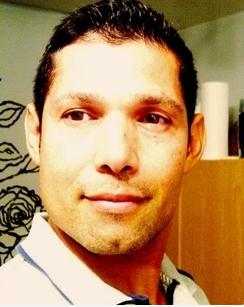UPDATE: Feb 27 — Israel Sanchez is back in Panama, after spending more than a month in a Canadian detention centre which he calls “a jail; plain and simple.”
In a letter to Xtra, Sanchez says he spent his time in the West End Canadian Border Services detention facility surrounded by “murderers, rapists and commoncriminals.” Two of whom tested positive for tuberculosis, he says.
Sanchez, who did not disclose his HIV-positive status while at the facility, feared for his health. Sanchez didn’t even admit he was gay during his seven-week stay, fearing retribution from the other prisoners who were waiting to be deported.
“I really don’t have a clue as to how get access to HIV medication here,” says Sanchez of Panama, where he has not lived in 25 years.
While he might be out of the country, Sanchez and his lawyer continue their application to get Sanchez permanent residency here in Canada.
UPDATE: Feb 23 — Government to deport gay Torontonian Monday
After one last-ditch effort to stay Israel Sanchez’s deportation, the Toronto resident is still set to be deported on Monday, Feb 25.
John Norquay, his lawyer, filed to defer the deportation until a judge can rule on whether or not Sanchez has grounds to stay in Canada under humanitarian and compassionate grounds.
While Sanchez will not be allowed to stay in Canada while that application is processed, it will continue if he is deported back to Panama. If a judge rules that he has sufficient ties to Canada and that there is some risk for him at home, he could be allowed to return and live here indefinitely.
Feb 22 — Government to deport gay Torontonian
Israel Sanchez fled Panama in 1988, when he was only 21. A journalism student, Sanchez saw many of his colleagues “disappear” at the hands of dictator Manuel Noriega.
So Sanchez escaped, arriving in Toronto to take advantage of Canada’s generous refugee system. But as his claim was being processed, a wrench was thrown into the machine – George HW Bush invaded Panama and installed a civilian government.
The Canadian Immigration and Refugee Board decided that the threat had passed and that Sanchez had no grounds to become a refugee. Having already established himself in Canada, he launched an appeal. In 1995, his appeal was dismissed – after having cycled through several lawyers, one of whom had a nervous breakdown.
Sanchez says he never heard from the immigration system after that. According to the system, he missed a pre-removal interview, and a deportation order was filed. Sanchez, seemingly oblivious, went on with his life. So when officers from the Canada Border Service Agency (CBSA) showed up on his doorstep Jan 8, he was surprised.
Over 25 years in Canada, Sanchez hardly made himself hard to find. Active in the queer and HIV communities, he made his living for more than a decade working as a bartender in the upscale Arcadian Court on Bay Street.
He got married in 2009, and his husband sponsored his residency status, finally giving him legal status in the country.
A year later, Sanchez and his husband opened up the trendy WAYLA bar in Leslieville. With a solid establishment in the city, they went to fill out the paperwork to get Sanchez’s permanent residency status.
During his application, he says, he never heard one word about the outstanding deportation order – one that’s been on the books for more than a decade.
But things unravelled. Sanchez and his husband split acrimoniously. Divorce proceedings are ongoing to see who will take over the bar. Sanchez’s sponsorship was revoked.
And then the border officers came. He was taken to the Toronto West Detention Centre and told that he would be sent back to Panama on Feb 25.
With the deportation order looming, he reached out to friends. They put him in touch with Michael Erickson, who published a petition in hopes of encouraging Immigration Minister Jason Kenney to intervene.
“People are in awe. It’s shocking that someone who’s been here for 25 years can just be grabbed and deported,” Erickson says. “He’s not been hiding. He’s a business owner.”
Citizenship and Immigration personnel point out that Sanchez has been in Canada illegally since 1998. The deportation order, no matter how old it is, still stands.
“Usually people know when something like this happens,” Erickson says. But with the deportation coming out of left field, Sanchez was hardly ready to mount a legal case. He initially went through two lawyers – both were unreliable and didn’t show up – before representing himself. He finally found proper legal representation from the HIV & AIDS Legal Clinic Ontario (HALCO).
John Norquay, a staff lawyer with HALCO, was assigned to Sanchez’s case and says the whole thing is peculiar. He can’t point to any other cases where the CBSA has taken more than a decade to enforce a deportation order – especially when the person hasn’t been hiding.
Norquay figures that Sanchez just “crossed his fingers and hoped for the best” after he didn’t hear back from the immigration system in 1995.
“It sounds to me that they just got around to figuring out where he was,” Norquay says. CBSA told Norquay that it was all a lack of interdepartmental communication by the CBSA and Immigration Canada, yet Norquay says he frequently deals with cases where Immigration passes on the location of those with outstanding deportation orders.
A spokesperson for Citizenship and Immigration says that they, and the CBSA, make every effort to inform applicants about hearing dates and deportation orders, adding that it is the claimants’ responsibility to ensure that the government has their correct contact information.
While Sanchez could be sent back to Panama – a country he hasn’t lived in since he was 21 – on Monday afternoon, Norquay sees a sliver of hope. In August, Sanchez filed an application to stay in Canada on humanitarian and compassionate grounds. If he can convince a Citizenship and Immigration judge that he is adequately settled in Canada and that Panama isn’t a good place for him (Norquay points out that “Panama is not a great place for gays . . . [nor] HIV-positive people”), he might just be allowed to return to Canada. Norquay is hoping to get that request heard before the deportation on Monday.
Norquay says public support could play an important role in proving that Sanchez really is an established community member in Toronto.
Xtra is following this story.


 Why you can trust Xtra
Why you can trust Xtra


